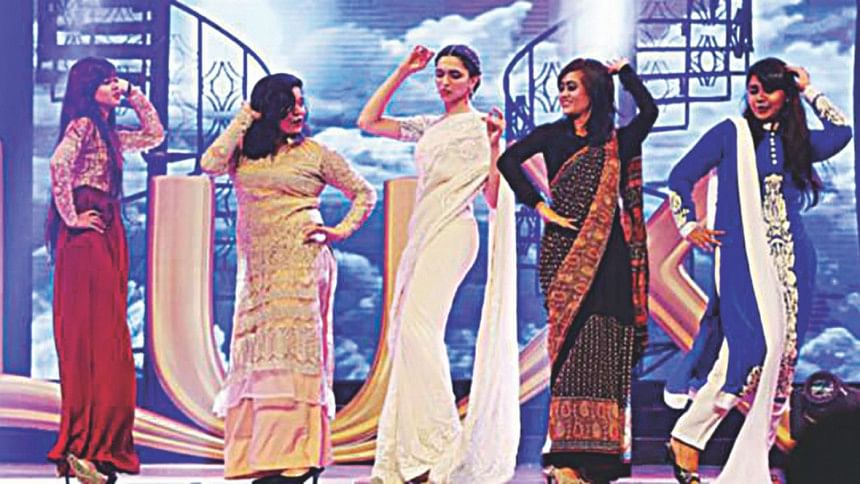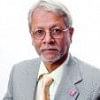Elbowed out by mind block

The morning was laden with an overcast sky, yet a brazen sunburst rifting through the haze bode a promising day. Despite the overwhelming laze and considerable reluctance, I moved my gaze away from the engaging serenity. With much disinterest I leafed through the pages of a newspaper lying beside me. There she was spread all across the front page, affording me a perchance face-to-face meeting. However virtual, the famed Indian silver screen infatuation of millions was in my hands.
Now Katrina Kaif does not have to know this, but I was then being driven along the curvaceous River Turag, silvery ripples on its darkened bed defining the placidity of the vicinity. That ambience and my paper as company should have been an exalting combination but for the irritation creeping in at the thought of a needless cultural invasion.
The commercial message carried by Kat's tinsel presence could have been easily conveyed by any of our deshi artistes, that too with aplomb and an effective native appeal. But, that is how the infantile minds of some advertisers have been working (or not) for some years now. And, yes, the point had been raised in this column in the past.
Considering that we have a bevy of able and popular actors, these phoren ingredients are not indispensable, although the likes of Alia Bhatt might perhaps be upset with the alien tag, what with them invading liberally the privacy of our homes to qualify as chicken of the house, read ghar ka murgi, although she may prefer being Badrinath ki Dulhaniya.
I also loved another Dulhaniya, Kajol. In the record-breaking blockbuster DDLJ she was closer to body wash while lip-syncing "Mere khwabon mein" in a towel wrap. Unfortunately, now she is selling us hand wash. Our very own Mousumi could have equally promoted children's hygiene without a bother. For the not-so-much-of-a-movie-buff, DDLJ is a quicker way of saying Dilwale Dulhania Le Jayenge.
Riding on her meteoric rise in the TV serial Kyunki Saas Bhi Kabhi Bahu Thi, Tulsi (aka Smriti Irani) is now the Indian Information and Broadcasting Minister, but, more importantly to us, she also made it to our public billboards, as if the product she marketed would not have sold had our Popy done the smile. Now those of you who do not know Sadika Parvin orofey Popy of Prem Korechi Besh Korechi should repeat their national vows. Arrey Bhai, she won the Bangladesh National Film Awards three times, and a damn good actor she is.
Due to the manmade cultural chaos, I am having to meet some Indian idols on a regular basis (you too) as well as cope with their dance moves and wide smiles on Bangladeshi TV channels. Why someone should be so happy to use a certain washing powder, whitening cream, hair colourer, or face wash is beyond my quiet time in the bathroom.
It's not only the female artists, but Ram Kumar of Bade Acche Lagtey Hai, Tiger Shroff of Baaghi and Hrithik Roshan of Krrish, to name a few, are doing their half best with their Hindi ads voiced in accented Bangla for the hatovaggo Bangalee clientele. Then there are some ads, performed by international non-entities, dubbed by people who do not speak Bangla with a Bangladeshi accent. Yes, we have younger artists who could fill up those gaps.
The content of some of these ads is unpalatable, particularly if one happens to be at the dining table, encountering with distaste the cleansing of a commode and the raising of sweaty underarms. My sympathies and anger however lie with the entire strength of our entertainment fraternity. How are they able to digest day in and day out Indian actors and technicians, music directors and producers, stealing their call in local TV channels?
Presumably, this dubbing of ads in Bangla is done to save money on the side of the advert producers, but at the cost of giving our viewers, especially the young, a totally wrong impression about pronunciation and intonation, and even the location.
I am all for the global village, but with mutual respect. It is a matter of ironic poignancy that not a single TV commercial starring Bangladeshi actors is shown on any Indian channel. Or, has ever been shown. Perhaps no billboard in any city or rural area displays our Mosharraf Karim, Jaya Ahsan, or Abul Hayat. The fault could lie with our policymakers and decision-takers. Why is it that Indian TV packages include channels from all over the world except neighbouring Bangladesh?
Soon after our liberation, an initiative by some distributors to import Indian movies for screening in our cinema halls was met with stiff opposition. Our producers, writers, actors, singers, musicians and technicians beseeched Bangabandhu that such a move would stunt our film industry. In spite of the tremendous support of the friendly Indian Army in the just-concluded war, since then no Indian film, save at film festivals, has been shown in our cinema halls—not that such a prohibitive measure has produced an Aamir Khan or a Rekha this side of Benapole. The need to restrict Indian movies also died down with improved technology because all films were available on video cassettes since the 1980s and for some years now on the net.
As with the dependence on Indian stars for commercial gain, Bangladeshi restaurant owners in England too suffered from a similar mind block. They named (some still do) their property "Delhi Darbar" or "Calcutta Curry House", certain that the Indian legacy was great for business. Inside was either Rustam Ali of Golapganj or Suruj Miah from Habiganj. During my PhD studies in the early 1980s, as the host of the live programme Balaka for Bangalee listeners on BBC Radio Sheffield, I pleaded with the mainly Sylheti restaurant owners to tag their premises as "Bangladeshi". Whether my appeal worked or not is debatable, but the situation has changed for the better over the last 20 years.
Today, Matin Miah's Ruposhi Bangla is one of some 10,000 hitherto so-called Indian restaurants in the UK, 85-90 percent of them run by Bangladeshis. Catering to Britain's national dish of mainly vindaloo and tikka masala, the industry is worth close to four billion pounds with nearly three million customers per week.
Let us not unnecessarily suffer from trade deficit. Let advertisement companies invest in our human resources by employing local producers, artistes, and technicians. Let Bangla be spoken on television as it should be.
Dr Nizamuddin Ahmed is a practising architect, a Commonwealth Scholar and a Fellow, a Baden-Powell Fellow Scout Leader, and a Major Donor Rotarian.





Comments